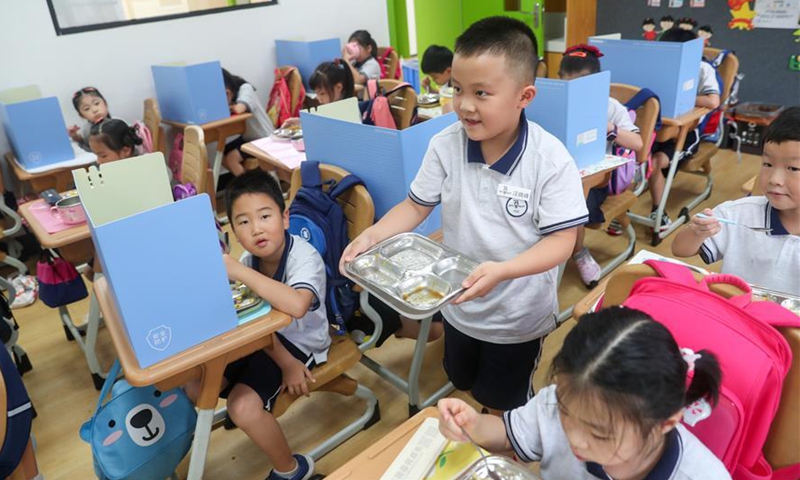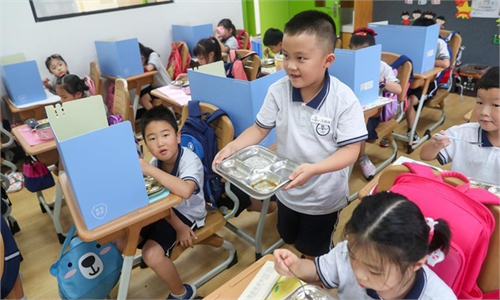
A student is on the way to return his empty plate at a primary school in Changning District of Shanghai, east China, Sept. 2, 2020. The school promotes the "Clear Your Plate" campaign to stem food waste as new semester begins. (Xinhua/Ding Ting)
China's draft law on food waste, submitted on Monday to the national top legislature for a second review, has specified that wasting food from excessive ordering may be fined according to certain charging standards. It also strengthened management over buffet services, online food delivery platforms, and banquets using public funds.
It is not uncommon to see a table of dishes being left over with half of it uneaten, or serving large amounts of various dishes at a buffet while only taking a bite or two from each of them. Such behavior is being strongly discouraged, as the Standing Committee of the 13th National People's Congress (NPC) reviews China's anti-food waste draft law on Monday, reported the Xinhua News Agency.
The draft law specifies that catering service operators can charge food disposal fees to consumers with excessive leftovers in their plates, while stressing that charging standards should be clearly stated.
Buffet service providers should actively inform consumers on the rules and requirements on food waste, provide tableware of different sizes, and remind consumers to take appropriate portions.
According to the draft, catering service operators will be fined up to 10,000 yuan ($1,526) if they mislead consumers into ordering excessively and if they refuse to rectify the situation.
Instead, they can give reminders by marking the food quantity, specifications, and recommended number of servings on the menu, and provide dinner sets for sharing and packaging.
The draft law also put forward requirements for online food delivery platforms, which have become a major meal option for many in China, especially young people.
It stated that those platforms should give ordering suggestions in a prominent manner to prevent food waste. For example, they can list information on the quantity and recommended portions on their platforms.
The draft also called for thriftier catering arrangements for civil servants, suggesting that staff at government departments and state-owned enterprises should play a leading role in preventing food waste.
If banquets need to be arranged for official activities, the number and form of meals should be arranged frugally and must not exceed certain standards.
The law enforcement department for food waste penalties has been specified. Penalties for catering service providers will be imposed by the supervision and administration department of the local government at county level and above, or other departments designated by the local government.
The first review of the draft legislation was carried out in December last year, which banned livestreaming eating shows on internet platforms and required governments above county level to establish food banks.
The legislation is seen as a crucial move, as China loses over 35 billion kilograms of grain in pre-consumption stages including storage, transportation and processing, said a report in December based on nationwide field research by NPC deputies.
Global Times


